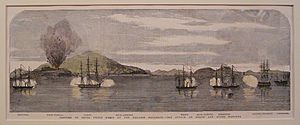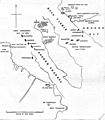Battle of the Bogue (1856) facts for kids
Quick facts for kids Battle of the Bogue |
|||||||
|---|---|---|---|---|---|---|---|
| Part of the Second Opium War | |||||||
 Attack on the North and South Wangtong Islands |
|||||||
|
|||||||
| Belligerents | |||||||
| Commanders and leaders | |||||||
| Michael Seymour | Ye Mingchen | ||||||
| Strength | |||||||
| 6 ships | 2,000 (500 in each fort) 410 guns |
||||||
| Casualties and losses | |||||||
| 1 killed 5 wounded |
unknown 410 guns lost 4 forts captured |
||||||
The Battle of the Bogue was an important fight during the Second Opium War. It happened in China, near the city of Humen, in November 1856. This battle involved British forces fighting against Chinese forces. The British won by taking control of several strong forts. These forts were located on the Wangtong Islands and Anunghoy Island.
Why the Battle Happened
The Second Opium War was a conflict between the British Empire and the Qing dynasty of China. It started because of disagreements over trade and how foreign countries were treated in China. The British wanted more trading rights. They also wanted to protect their citizens in China.
Before the Battle of the Bogue, the British commander, Michael Seymour, asked the Chinese to give up their forts. These forts were very important for controlling the Humen strait. The Chinese commander, Ye Mingchen, refused to give them up. He said he would "lose his head" if he did. This meant he would be punished severely. Because of this refusal, a battle became necessary.
The Battle Begins
The battle started on November 12, 1856. The British navy had six ships ready for the fight. They aimed their attack at two forts on the Wangtong Islands. These forts were well-defended. They had over 200 cannons and many Chinese soldiers.
The Chinese soldiers fought bravely. They even threw "stinkpots" at the British. Stinkpots were jars filled with a smelly, burning mix. They were used to confuse and bother the enemy. Chinese soldiers stayed at their cannons until the very last moment. They had boats ready to escape if needed.
After about an hour of fighting, the British took control of the Wangtong Island forts. The Chinese resistance was strong but not well-organized. The British had only one soldier killed and five wounded during this part of the battle.
Capturing More Forts
The next day, November 13, the British continued their attack. They moved on to the Anunghoy forts. These forts were also heavily armed, with 210 cannons. The British faced some resistance here too. However, they managed to capture these forts without any more casualties.
By the end of the two-day battle, the British had captured four important forts. They also took control of all 410 cannons in those forts. This was a clear victory for the British forces.
After the Battle
The Battle of the Bogue was an important step in the Second Opium War. It showed the strength of the British navy. It also helped the British gain more control in the region. The war continued for several more years. It ended with the Treaty of Tianjin in 1858 and the Convention of Peking in 1860. These agreements gave more rights to foreign powers in China.
Gallery




